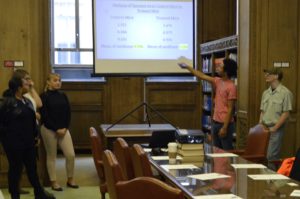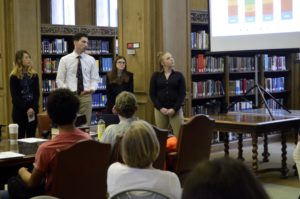Clairton City and Laurel Highlands teams present projects at Mellon Institute

For James, a Laurel Highlands High School student, working on a project with scientists at Carnegie Mellon University’s interdisciplinary neuroscience venture, BrainHub, was a chance to apply learning and bring life to statistics courses that can otherwise seem dry.
For Salina, a student from Clairton City High School, working on a similar project represented a chance not just to apply learning, but to do it with a team of peers.
“I learned so much from them,” she said as her team and the one from Laurel Highlands debriefed after presenting findings from their work at Mellon Institute in December.
Through a collaboration between CMU’s BrainHub and the Consortium, both teams worked over the fall semester to analyze data coming from experiments that BrainHub scientist Alison Barth, Ph.D. and her research team are conducting.
Dr. Barth’s experiments with mice are aimed at finding out whether and how learning changes the brain. For the students, however, “The projects were about how to look at data and how to use it,” she said as she introduced the teams for their final presentations. The Brainhub scientists work with high school students as part of a community outreach initiative called Brainstorm.
In a nutshell, the kids from Clairton determined from data that mice seem to develop more neural capacity after training. The Laurel Highlands team found that mice learn to make associations between external cues and rewards, much like Pavlov found that dogs could be conditioned to associate the sound of a bell with food.
The kids, however, gained understanding far beyond raw results. For example, during question and answer sessions after their presentations, a number of the youngsters said it became apparent to them how conclusions can be limited by “sample size.” Most also pointed to soft skills developed from working on teams.

Additionally, all came to grasp a fundamental principle of scientific research—that even when experiments prove hypotheses wrong, they still produce important learning.
Perhaps because we live in a results-driven world, the tenet was initially a little disconcerting. “It surprised me that it doesn’t matter what you find,” said Jayla, one of the Clairton team members.
It came not just as a surprise, but a bit of a relief to kids who must usually focus on getting good grades and the right answers to test questions.
The fact that the projects weren’t graded, however, didn’t make the students feel any less invested.
“If anything, we worked harder,” said Jayla. “We knew this had to be presentable.”






